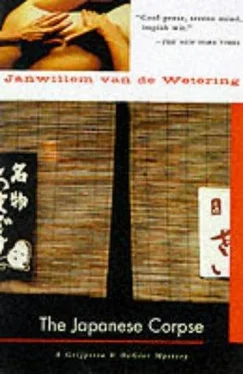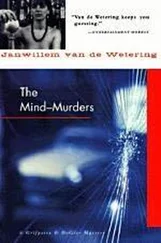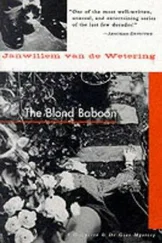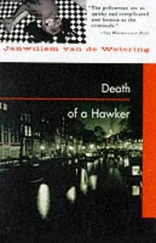Janwillem De Wetering - The Japanese Corpse
Здесь есть возможность читать онлайн «Janwillem De Wetering - The Japanese Corpse» весь текст электронной книги совершенно бесплатно (целиком полную версию без сокращений). В некоторых случаях можно слушать аудио, скачать через торрент в формате fb2 и присутствует краткое содержание. Жанр: Полицейский детектив, на английском языке. Описание произведения, (предисловие) а так же отзывы посетителей доступны на портале библиотеки ЛибКат.
- Название:The Japanese Corpse
- Автор:
- Жанр:
- Год:неизвестен
- ISBN:нет данных
- Рейтинг книги:3 / 5. Голосов: 1
-
Избранное:Добавить в избранное
- Отзывы:
-
Ваша оценка:
- 60
- 1
- 2
- 3
- 4
- 5
The Japanese Corpse: краткое содержание, описание и аннотация
Предлагаем к чтению аннотацию, описание, краткое содержание или предисловие (зависит от того, что написал сам автор книги «The Japanese Corpse»). Если вы не нашли необходимую информацию о книге — напишите в комментариях, мы постараемся отыскать её.
The Japanese Corpse — читать онлайн бесплатно полную книгу (весь текст) целиком
Ниже представлен текст книги, разбитый по страницам. Система сохранения места последней прочитанной страницы, позволяет с удобством читать онлайн бесплатно книгу «The Japanese Corpse», без необходимости каждый раз заново искать на чём Вы остановились. Поставьте закладку, и сможете в любой момент перейти на страницу, на которой закончили чтение.
Интервал:
Закладка:
"I have been told that you gentlemen are setting up a direct link in the art business," Mr. Woo said, smiling politely without changing the expression of his large dark eyes, "and have found a way to stall the organization which, so far, had the monopoly." Mr. Woo stressed the word "had" and repeated the last part of his message to make sure that it would get across.
The commissaris nodded sleepily.
"I am referring to the yakusa," Mr. Woo said, biting off the word.
"Yes," the commissaris said, "the yakusa. Competition is part of the free world. We live in the free world."
"Indeed?" Mr. Woo asked.
The commissaris yawned.
"Are you in the art business too?" de Gier asked, after a quarter of a minute had slowly ebbed away.
"No. I have other merchandise for sale, merchandise the yakusa used to buy through me, but I don't think they will want to buy now. Their business went through Amsterdam, but something has happened and the channel is blocked, temporarily perhaps, for a long time maybe."
"Really?" the commissaris asked.
"Yes. I am well informed. And so are you, I think."
"Something has happened," the commissaris agreed. "A friend told me about it on the telephone. It is very easy to telephone these days. News travels quickly."
Mr. Woo had been resting on his knees and he shifted his position, but he still wasn't comfortable. He smiled painfully. "Living on the floor is a custom I am not used to," he explained slowly. "In China we have chairs."
"I am sorry," de Gier said, "this is a Japanese inn. No chairs. But sit down any way you like. Perhaps you can rest your back against the wall. I do that all the time. It's not very polite, I believe, but foreigners are easily forgiven."
Mr. Woo thanked him, took the offered cushion and found an easier way to sit. He opened his case and held up two little plastic bags filled with white powder.
"Heroin?" the commissaris asked.
"Heroin, best quality, samples, free samples for you gentlemen. I have ten kilos ready for shipment in Hong Kong. I am asking a reasonable price. If you pay me here I will telephone my agent who can deliver to your agent. But the delivery will be in Hong Kong, and once the goods are in your hands they travel at your risk."
"I see," the commissaris said, and picked up one of the bags, holding it against the light. "And the price?"
"In Germany American soldiers will pay thirty dollars for a small teaspoon filled with these pure crystals. I will charge you a price which will allow for an unheard-of profit. You will be very rich, your organization will be very powerful. The supply is plentiful and the origin is the most reliable country in the world."
"Communist China?" the commissaris asked softly.
"The very best," Mr. Woo agreed. "Steady prices, prompt delivery and never a broken promise."
He took out his pocketbook and peeled a hundred-dollar bill out of its back compartment, tearing it in half. "Here. You take one half, I keep one half. You send your half to your agent, I send my half to my agent. They will meet in Hong Kong. As soon as you pay me I will telephone my agent in your presence. He will be in the company of your agent, and you can speak to your agent. Delivery will be made at once. But only ten kilos the first time. It will be a trial for you and a trial for us. Then, when the connection has been proved and you want more merchandise, I will be on your path, wherever you want to find me. I travel quickly."
The commissaris puffed on his cigar and checked its burning end, peering at it with one eye. "I am an art dealer," he said, and looked at the white wall opposite him, "and the drug is not my article. However, it can be tried. Perhaps the drug can use some of the channels we have established for other purposes. And I know many Americans, most of them stationed in Europe. I might give it a try, if my associate is willing."
De Gier took his cue. There was greed in his large brown eyes when he turned to offer his smile to Mr. Woo.
"I have some friends too," de Gier said, "in Amsterdam itself. There is some demand for the drug in our city. I could take care of that market while the chief (he bowed into the commissaris' direction) goes for Mr. Big and Mr. Super."
"Good," Mr. Woo said. "So we make a try. I will come back in four days' time. You give me money and I will telephone."
The commissaris took the half note and the little piece of paper on which Mr. Woo had written the amount involved in the transaction. He read the numbers and nodded.
"Right. But I won't be ready in four days' time. We have other appointments to keep. Next week, same day, same time."
Mr. Woo was on his feet and on his way to the door. De Gier jumped up and saw him out of the room and walked down to the hall with him.
"Next week, same day, same time," Mr. Woo said, as he laced his shoes. "And perhaps there should be no tricks. Tricks work once but then death follows. Always. I have seen it several times. Death has a bad face."
"I have met the power myself," de Gier said, and grinned. "Death has no favorites, it has worked for us too. Have a good day, Mr. Woo."
But Mr. Woo wasn't listening. He had knocked his head against the low beam at the entrance and was rubbing his bald crown, muttering something in Chinese.
De Gier grinned again. He had knocked his head against the beam too. Almost every day so far, and they had been staying at the inn for more than two weeks.
When the sergeant came back to the large quiet room, he stopped with surprise. The commissaris was capering around the low table, waving his arms and singing the end line of a nonsense rhyme which had been a hit on the Dutch TV and had caused a lot of comment in the conservative newspapers of Holland, although the song had contained no dirty words or sly allusions. It was pure idiocy and its last line was Mother there walks an eagle.
"Sir?" de Gier asked.
'"Mother, there walks an eagle,'" the commissaris sang, and stopped and stared and pulled up his eyelids so that his eyes became round and large.
"Sir?"
"You know what this means, sergeant?" the commissaris whispered, putting his finger on de Gier's nose and pressing it. "You know what this means? This means we don't have to go to Kobe to rush about and find the drug supply. We can sit here and work it all out, the way we want to work it out. It's all coming our way. Just for once, just for the hell of it. Things are tricky and awkward and the other way round and upside down for eight hundred seventy-six times, and then, suddenly, just one time, things are right. RIGHT. You hear? Hehehe."
De Gier stepped back and rubbed his nose.
"'Mother, there walks an eagle,'" the commissaris said. "I always knew what that line meant. A little boy looks out of the window of an apartment of the ninth floor somewhere in Amsterdam North, one of those big gray buildings made of leaky concrete, and he sees the eagle walking about on the balcony. A big eagle (the commissaris gestured wildly). Crest of feathers on the noble head. (The commissaris spread the fingers of his right hand and held it on his head.) Polished golden beak. (The hand changed shape, fingers tight together and bent down, the back of the hand rested against his nose.) Wings spread. Strutting about. Like this. (The commissaris walked up and down, arms spread, body hunched, head erect.) The boy always knew it would happen one day. There is no need to tell his mother. She doesn't know anything, but he teUs her all the same. She is his mother after all, and she is in the apartment with him. But she just nods and won't even get off the couch. It doesn't matter. The eagle is there, on the balcony. The little boy's dream is there. A big eagle, life-size. Walking around. On the balcony. Hehehe."
The commissaris was capering around again and getting close to de Gier, who stepped back, protecting his nose with his hand.
Читать дальшеИнтервал:
Закладка:
Похожие книги на «The Japanese Corpse»
Представляем Вашему вниманию похожие книги на «The Japanese Corpse» списком для выбора. Мы отобрали схожую по названию и смыслу литературу в надежде предоставить читателям больше вариантов отыскать новые, интересные, ещё непрочитанные произведения.
Обсуждение, отзывы о книге «The Japanese Corpse» и просто собственные мнения читателей. Оставьте ваши комментарии, напишите, что Вы думаете о произведении, его смысле или главных героях. Укажите что конкретно понравилось, а что нет, и почему Вы так считаете.












